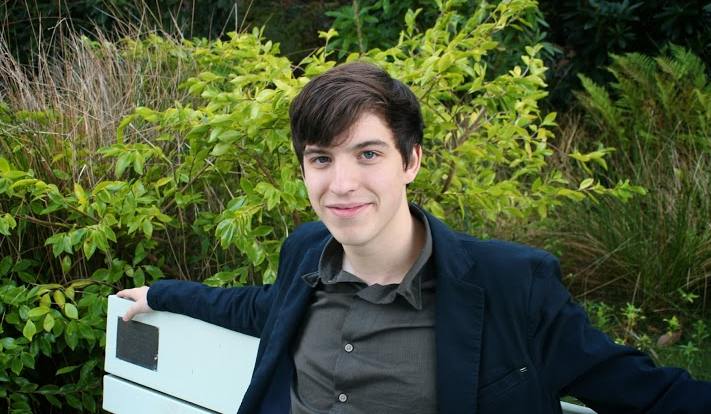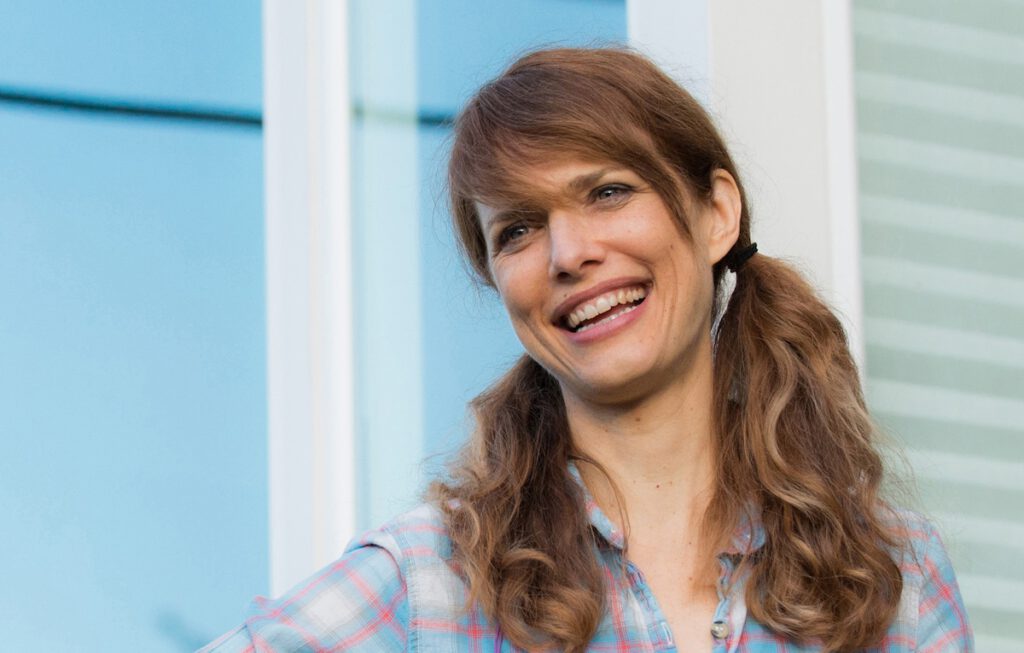After only six feature films, Lynn Shelton is rapidly building an impressive and distinguishable body of work. Defined by her naturalistic aesthetic, Shelton has a knack for crafting identifiable, original and emotionally charged narratives (“Humpday“, “Your Sister’s Sisters” and “Touchy Feely“) that deftly operate within the world we inhabit.
“Laggies” is Shelton’s fourth film to premiere at the festival. Once again the down-to-earth filmmaker constructs a lovingly made film about people aimlessly floating through life in pursuit of an identity. I wrote more about Shelton’s Sundance gem here. Yesterday I sat down with Shelton to talk about the film.
Sam Fragoso: In making “Laggies” and your other films, who and what are your primary influences? This could be a filmmaker, a musician, a painter, etc.
Lynn Shelton: You could call “Laggies” a “rom-com” but I think it’s also a belated coming-of-age movie. And rom-coms are something I’ve often stayed clear of because I generally tend to know what’s going to happen after the first ten minutes.
And you’re very good at misdirecting the viewer in a way that still feels grounded in reality.
That’s what I’m going for. I like unexpected journeys that I can believe every step of the way. There are surprises but they don’t come out of left field.
Because that immediately takes you out of the film.
Yeah, so I feel (to answer the original question) a hovering presence for us over the film in general was James L. Brooks. There was movie he made that you’d definitely call a rom-com titled “Broadcast News.”
One of my favorites.
It’s such a great movie. And I can go back to that again and again and it always holds up. The dialogue is incredibly funny, so distinct and so real, and in that movie he doesn’t end up with anybody. Talk about unexpected. That was a real beacon for me in general. I always said that if I were going to do a rom-com it would have to be along those lines. Even “The Philadelphia Story” is another one I love thinking about because she does end up with one of the guys, but you don’t know if she’s going to end up with Jimmy Stewart or Cary Grant. There is contention.
Those were big influences in general, not for any specific tone or style. “Laggies” was a film that I really wasn’t planning on using a lot of improv. We used improv as a garnish (I’m stealing Sam Rockwell‘s description here); the main meal was this great script that Andrea Seigel had written. It was nice to remind myself that it is possible to make a movie that feels naturalistic, where people feel like real people and yet you have written dialogue. If you can find the right actors that can really convert those scripted lines in the right way they can sort of alchemically turn it into gold.
That seems to be one of your strong suites, casting the right people in right roles.
Yeah, and as soon as I get any push from producers about…
Actors and actresses who are not marketable.
Yes, “let’s look at this list of people who would be so good for financing.” And I’m just like, listen, if you don’t let me cast people who are right for the part this is not going to be a good movie and you’re going to be sad you hired me.
You’ve touched on the impromptu nature of your films, all of which (from “Humpday” to “Your Sister's Sister” to “Touchy Feely”) give the impression that these performers are making this up on the spot (and perhaps they are).
Well, for “Humpday” we had an outline and every single piece of dialogue was improvised. I found two really good improvisers (and Alycia Delmore, who was pretty damn good too) and just turned two cameras on at the same time, one on each actor. We always talked and talked and talked ad nauseam before shooting, but no rehearsals. We want to be shooting the rehearsal. It’s a really specific way of working and you really end up writing the movie in the editing room.
”Your Sister’s Sister” was probably 80% improvised, but I wrote a script that we could toss out or use if we wanted to. Two of the actors were not as veteran at that kind of work (Rosemarie DeWitt and Emily Blunt). “Touchy Feely” ended up being 75% scripted. It was a different kind of movie, more meditative with a lot of characters that are inarticulate, not a lot of banter. The actors wanted to stick to the script.
I’m basically all about whatever works. In this case with “Laggies” it has such a strong script.
You mentioned that this is not your script.
For the first time, yes.

Going into the movie all I knew is that it was made by you. When the film ended and the “Written by Andrea Seigel” title card came up, I was surprised because the film feels like it was made in the same vein as your other pictures.
I’ve been so curious of whether it would feel like one of my movies. I didn’t want it to feel like I was suddenly a director-for-hire. I also wanted a way to merge my voice with her voice [Seigel’s].
Did you find that process to be difficult?
No. It was a new process for me, but it was a really fulfilling one and well worthwhile. I’ve read so many scripts and had sort of started despairing that I would be able to direct anyone else’s material. Even really good scripts I just rarely felt connected to them. This one was amazing, a bolt from the blue. It felt like something I could’ve come up with myself. It was such an immediate fit.
Do you see yourself going down that road again?
For the right project, absolutely.
To change topics, I’d like to talk about the paucity of women in Hollywood. Last year upwards of 125 films were widely released across the country. Of those films, females helmed only three. Moreover women make up more than 50% of the ticket buyers in this country. The saddening stats go on and on. Why do you feel this is still an issue in 2014?
I think it’s a culturally systemic issue, I really do. There was a really great article that came out a week ago right before Sundance started by Lexi Alexander. She specifically mentions this company Etsy and the founder of the company who really wanted to address the issue of gender in employment. So he put one policy into place and it had terrible results. The hiring of women went down. He threw that plan out the window, went back and looked at policies that actually worked in the past. Now it’s like 50/50 in the company.
I don’t think this is hopeless. I think there are ways to address the issue, change people’s behavior and get more women hired. I really feel like it’s force of habit at this point. The fact is the longer it goes on the worse it is. What ends up happening is that you hire the people you know, and then the people you know who can do the job are the same people who’ve already been hired before. It’s kind of a self-perpetuating problem.
It’s hard to break into the system.
Yeah, and then the people who do break in are of the same mold—namely white guys.
What advice do you give women attempting to break into the movie industry as a director?
Well, I can’t recommend my journey enough. Instead of going to Hollywood and saying, “please let me make my movie” I just took friends and a camera and made movies. I did that two or three times and got my third film into Sundance and then suddenly I got new opportunities that I hadn’t even been looking for. So I just didn’t go the traditional route. For any young filmmaker I can’t recommend that enough.
Did you know early on that you weren’t going to go to Hollywood?
Yeah I came to filmmaking from a very circuitous, back-roads route. I ended up not going to film school, moved to New York and just started doing downtown theater. Then I fell out of love with theater and ended up at School of Visual Arts for photography. I started making these experimental films and videos. I got out of school and was editing other people’s movies. Writing grants, learning how to raise money, etc. Eventually when I started making feature films, that started serving me really well and I could raise money in a non-profit way.
So you learned how to do everything else before making your movie?
Yes! My first time on a film set was really the first time I was directing.
Was that terrifying?
It was terrifying and completely exhilarating. It changed my life. I knew immediately that this is what I’ve always meant to [do]. Because I had been making my little experimental films all on my own, a lot of it was not wanting to ask for help and wanting to keep total control. I am a total control freak. On set with all these people I had to let go and trust that they were going to do their jobs. It didn’t seem like micromanaging was a good idea. That was incredibly terrifying, and unbelievably liberating. From that moment on art-making for me became about collaboration.
I think you mentioned you’ve used the same DP [Director of Photography] your whole career, yes?
The same DP, lots of the same crew as well.
That’s a good approach though—a lot of familiarity and comfort on set.
Exactly, and everyone knows my MO, and I think emotional safety on set is really important. It’s important to have people who are all mutually supportive of each other and it allows everybody to do their best work. Everybody is equal.
Wrapping things up, I have a pretty good idea of what “Laggies” is about. But what is something you hope the film articulates to viewers?
I like the way the film has a lot of layers.
You mention the dual coming-of-age stories.
Exactly. There’s this interesting parallel. When we’re teenagers we’re trying to figure out who we are and where we fit in the world. That’s a question that can come up at any point in your life.
[At this point Sam Rockwell politely interrupts us to say goodbye to Shelton.]
What was I in the middle of? Oh yes, the eternal fascination I have as an artist is the question of self. And how we change in relationships. Most of the time we have other people who provide a mirror for ourselves. Our self and our identity are really interesting to me. Who am I? That question. So I tend to gravitate towards stories that allow characters the opportunity to take stock of themselves and where they are in their lives. There are these times in our life that we sort of go down the current and get a groove, a routine and something will happen and you hit a logjam. It’s like “oh shit what’s going on, where am I, who am I,” you know?
And that’s an identifiable pursuit for most people.
Absolutely, I think it’s very human. So I’m very interested in how we perceive ourselves. “Laggies” provided that on so many levels. I want to explore territory that’s interesting enough and resonant enough that it stays with people and they think about it for a few hours, or a few days, or a few weeks. And they have conversations with people who have seen it. That’s what I hope for.












